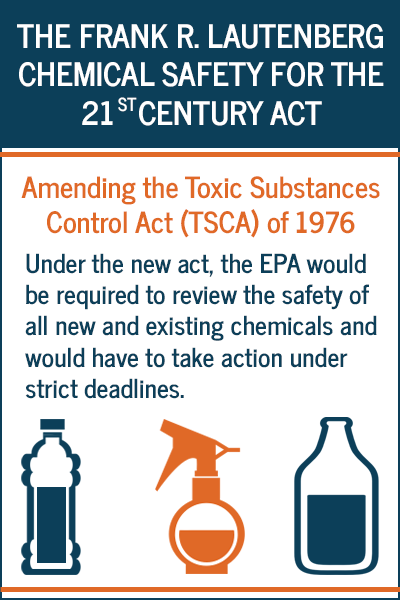More than 80,000 chemicals are used today in the U.S. Unfortunately, not all of them have been adequately tested. As a result of these regulatory failures, consumers are exposed every day to chemicals that have the potential to cause cancer, birth defects, and other catastrophic problems.
In an effort to better protect the public, Congress passed legislation this month that would allow the U.S. Environmental Protection Agency (EPA) to obtain more information about thousands of chemicals found in common products.
Under the Frank R. Lautenberg Chemical Safety for the 21st Century Act, the EPA would be required to review the safety of all new and existing chemicals and would have to take action under strict deadlines. More specifically, the EPA would have specified deadlines to “… designate a certain number of existing chemicals as high- or low-priority for safety assessments and determinations and conduct safety assessments and determinations for high-priority chemicals.”
Further, the EPA would be required to “…prohibit or restrict the manufacture, processing, use, distribution, or disposal” of a new chemical or new use of an existing chemical if it will not likely meet the standard. The act also revises preemption provisions; once the EPA starts a safety assessment, the preemption of state restrictions on high-priority substances begins.

The new act amends the Toxic Substances Control Act (TSCA) of 1976, which presently provides the EPA with the authority to require reporting, record-keeping, testing and restrictions related to chemicals. Many have argued the 40-year-old act is ineffective with the ever-growing production and use of both natural and synthetic chemicals. Even with the new act’s improvements to the TSCA, however, many believe regulations still fail to fully protect against chemicals linked to health problems.
The responsibility to protect consumers does not lie solely with the federal government, however.
Product manufacturers are also expected to test their goods and warn consumers of potential related hazards. People are unnecessarily harmed when they fail to do so. For decades, the attorneys at Anapol Weiss have been advocating on behalf of individuals who were injured and the loved ones of those killed by defective and dangerous products. If it happened to you or a family member, contact our firm to speak with a highly qualified product liability attorney.
